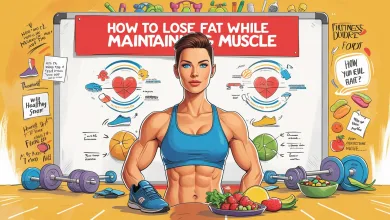Why Rapid Weight Loss Often Leads to Regain: The Science Explained

We’ve all been tempted by those “lose 10 pounds in a week” promises, but the science shows why quick fixes ultimately fail. This comprehensive guide explains the biological mechanisms behind weight regain after rapid loss and offers research-backed approaches for lasting results.
Ever noticed how those dramatic before-and-after weight loss stories tend to disappear after a few months? There’s a frustrating truth that the $72 billion weight loss industry doesn’t want you to know: rapid weight loss almost invariably leads to weight regain—often leaving you heavier than when you started. But why does this happen? It’s not simply about willpower or discipline. The answer lies in a complex interplay of biology, psychology, and physiology that creates the perfect storm for weight regain after quick loss.
In this article, we’ll dive deep into the science behind why crash diets and extreme weight loss methods fail in the long run. You’ll learn about the powerful biological mechanisms that fight against rapid weight loss, discover why your body responds differently to gradual versus rapid weight changes, and explore evidence-based strategies that actually work for sustainable weight management. If you’ve ever lost weight only to regain it (and then some), you’re not alone—and it’s not your fault. Let’s uncover the science that explains this frustrating cycle.
The Biology Behind Weight Regain
When it comes to understanding why rapid weight loss backfires, we need to start with a fundamental truth: your body doesn’t know you’re trying to look good for beach season. Instead, it interprets sudden, dramatic calorie reduction as a potential famine—triggering ancient survival mechanisms designed to keep you alive.
These biological adaptations were incredibly useful for our ancestors who faced genuine food scarcity, but they’re remarkably problematic in our modern environment of abundance. Your body essentially fights against rapid weight loss through multiple systems working in concert to defend what it perceives as your “normal” weight range.
One of the primary defenders against weight loss is your metabolism. When you drastically cut calories, your metabolic rate slows down significantly—sometimes by as much as 20-30%. This phenomenon, known as “adaptive thermogenesis” or “metabolic adaptation,” means your body becomes extremely efficient at using fewer calories to perform the same functions. A landmark study published in the journal Obesity followed contestants from the TV show “The Biggest Loser” and found that their metabolisms remained suppressed for years after their dramatic weight loss, burning hundreds fewer calories daily than would be expected for people of their size.
But metabolism is just one piece of the puzzle. Your body also orchestrates a complex hormonal response to rapid weight loss that practically guarantees weight regain. Leptin, often called the “satiety hormone,” plummets during fast weight loss—increasing hunger signals dramatically. Meanwhile, ghrelin, the “hunger hormone,” increases substantially, creating persistent, powerful urges to eat. This hormonal double-whammy creates a biological environment where your body is essentially screaming at you to eat more, making sustained weight loss extraordinarily difficult.
Hunger Hormones: Your Body’s Powerful Pushback Mechanism
Let’s dive deeper into those hunger hormones, because they’re absolutely central to understanding why rapid weight loss typically fails. When you lose weight quickly, your body doesn’t just passively accept this change—it actively fights back through powerful hormonal shifts designed to restore what it perceives as your “normal” weight.
The most dramatic shift happens with leptin, which is produced by your fat cells and signals satiety to your brain. When fat stores decrease rapidly, leptin levels plummet—sometimes by 50% or more. This drop tells your brain you’re starving (even if you’ve got plenty of stored energy left), triggering intense hunger signals and food-seeking behaviors. At the same time, ghrelin levels surge, creating persistent hunger pangs that can become nearly impossible to ignore.
This hormonal rebellion isn’t temporary, either. Research from the University of Melbourne tracked individuals who lost weight rapidly and found that these hunger-promoting hormonal changes persisted for at least a year after weight loss. That’s a full year of fighting against biological signals that make you feel constantly hungry!
Even more concerning, your brain’s reward centers become hyperresponsive to food after rapid weight loss. Brain imaging studies show increased activation in regions associated with reward, attention, and food motivation in people who have lost weight quickly. This means not only do you feel hungrier, but food actually becomes more appealing and harder to resist. It’s a perfect neurobiological storm that makes maintaining weight loss extremely challenging.
Muscle Loss: The Hidden Cost of Rapid Weight Loss
When you lose weight too quickly, you’re not just losing fat—you’re losing substantial amounts of muscle as well. This muscle loss is a critical but often overlooked factor in why rapid weight loss ultimately fails.
During crash diets or extreme calorie restriction, your body can’t meet its energy needs from fat stores quickly enough, so it turns to muscle as an additional energy source. Research shows that rapid weight loss can cause up to 30% of the weight lost to come from lean muscle mass rather than fat. This is disastrous for long-term weight management for several reasons.
First, muscle tissue is metabolically active, burning calories even at rest. When you lose muscle, your resting metabolic rate decreases—meaning you burn fewer calories throughout the day even when doing nothing. This creates a frustrating scenario where you need to eat even less to maintain your weight loss, which is rarely sustainable long-term.
Second, muscle loss affects physical performance and energy levels. With less muscle mass, everyday activities become more challenging, and workouts feel more difficult. This often leads to reduced physical activity, which further contributes to weight regain. The vicious cycle continues as reduced activity leads to more muscle loss, further metabolic slowdown, and even greater difficulty maintaining weight loss.
Preserving muscle mass during weight loss requires two key elements: adequate protein intake and resistance training. Research published in the American Journal of Clinical Nutrition demonstrates that higher protein intake during weight loss (around 25-30% of total calories) helps preserve muscle mass significantly better than standard protein intakes. Similarly, maintaining a resistance training program during weight loss has been shown to protect muscle tissue even in substantial calorie deficits.
Psychological Factors: The Mental Toll of Yo-Yo Dieting
The impact of rapid weight loss and subsequent regain isn’t just physical—it takes a serious psychological toll as well. This mental dimension plays a crucial role in the cycle of weight regain that often follows crash diets.
When you embark on a drastic weight loss plan, you’re essentially putting yourself into a state of deprivation. The extreme restrictions common in rapid weight loss approaches trigger psychological responses that make long-term adherence nearly impossible. Research from the University of California found that dietary restriction actually increases both the desire for and the attention paid to forbidden foods. The more you try not to think about chocolate cake, the more your brain fixates on it!
This psychological effect combines with the biological hunger signals we discussed earlier to create overwhelming urges to eat, which eventually lead to what many people experience as “willpower failure.” But it’s not really a failure of willpower—it’s the predictable result of biological and psychological systems working exactly as they’re designed to.
The experience of regaining weight after significant effort to lose it also carries emotional consequences. Many people internalize weight regain as a personal failure, leading to feelings of shame, guilt, and decreased self-efficacy. This emotional burden can trigger stress eating and avoidance of healthy behaviors, further contributing to weight regain and establishing a negative psychological cycle.
Perhaps most damaging is the development of disordered eating patterns. Research published in the International Journal of Obesity found that people who engaged in repeated cycles of rapid weight loss and regain were more likely to develop problematic relationships with food, including binge eating behaviors. These patterns further complicate weight management and can have serious health consequences beyond weight itself.
Sustainable Alternatives: Evidence-Based Approaches That Work
Despite the discouraging science behind rapid weight loss and regain, there’s good news: research has identified approaches that actually work for long-term weight management. These methods work with your body’s biology rather than against it, leading to more sustainable results.
The most fundamental principle for sustainable weight management is gradual weight loss. Research consistently shows that slower weight loss—typically 1-2 pounds per week at most—leads to better long-term outcomes. A study published in the International Journal of Obesity found that people who lost weight gradually were more likely to maintain their losses over time compared to those who lost weight quickly.
Gradual weight loss offers several advantages:
- It allows your body to adapt metabolically with less dramatic adaptive thermogenesis
- It preserves more muscle mass, keeping your metabolism higher
- It creates smaller decreases in leptin and smaller increases in ghrelin, reducing hunger
- It provides time to develop sustainable eating habits rather than temporary restrictions
Another key element of sustainable weight management is focusing on diet quality rather than just calorie counting. Research from Harvard University suggests that what you eat may be more important than how much when it comes to weight management. Foods with higher protein and fiber content, lower glycemic loads, and minimal processing tend to support better weight management outcomes.
Regular physical activity—particularly a combination of aerobic exercise and resistance training—is another cornerstone of sustainable weight management. Beyond the calories burned during exercise, physical activity helps preserve muscle mass, improves metabolic flexibility, and may help regulate appetite hormones. The National Weight Control Registry, which tracks successful long-term weight loss maintainers, finds that consistent physical activity is one of the most common behaviors among those who keep weight off.
The Role of Habit Formation in Long-Term Success
When we look at people who successfully maintain weight loss long-term, one pattern stands out clearly: they’ve transitioned from “dieting” to establishing sustainable habits. This shift from temporary changes to permanent lifestyle adjustments is perhaps the most crucial element of long-term weight management success.
Research in behavior change shows that habits—automated behaviors triggered by specific contexts—are much more sustainable than actions requiring constant willpower or decision-making. A study published in the British Journal of General Practice found that habit formation was a key predictor of long-term adherence to health behaviors.
Successful habit formation for weight management typically includes:
- Consistent meal timing and structure
- Regular physical activity integrated into daily routines
- Food preparation and planning systems
- Consistent sleep schedules
- Stress management practices
- Regular self-monitoring of weight and behaviors
These habits create a framework that supports weight maintenance without requiring constant vigilance or willpower. Over time, healthy behaviors become increasingly automatic, requiring less mental energy to maintain.
Importantly, sustainable habits need to be personalized. What works for one person may not work for another, which is why cookie-cutter diet plans often fail in the long run. Factors like food preferences, cultural background, schedule constraints, and even genetics influence which habits will be sustainable for each individual. The most successful approaches allow for personalization while maintaining core evidence-based principles.
Understanding Your Personal Weight Regulation Set Point
One of the most important concepts in modern weight science is the “set point theory,” which helps explain why weight loss maintenance is so challenging and why individualized approaches are essential.
According to set point theory, your body has a preferred weight range that it defends through various biological mechanisms. This range is determined by a complex interaction of genetics, epigenetics (how your genes are expressed), early life experiences, and environmental factors. When you try to move below your set point through dieting, your body activates the various defensive mechanisms we’ve discussed—metabolic adaptation, hormonal changes, and psychological responses—to bring you back to your preferred range.
Research suggests that rapid weight loss triggers particularly strong defensive responses to protect your set point. However, more gradual approaches may allow for a gentler “resetting” of this biological thermostat. Studies show that maintaining a stable lower weight for an extended period (typically at least 6-12 months) may help establish a new, lower set point with less biological resistance.
Understanding your personal set point has important implications:
- It explains why some people struggle more with weight management than others despite similar efforts
- It suggests that modest, sustainable weight loss may be more realistic than dramatic transformations
- It highlights the importance of individualizing weight management approaches rather than using one-size-fits-all targets
Perhaps most importantly, set point theory reminds us that body weight is not simply a matter of personal choice or willpower—it’s heavily influenced by biology that differs from person to person. This understanding can help reduce self-blame and stigma while focusing attention on evidence-based approaches that work with, rather than against, your body’s natural regulatory systems.
FAQs About Rapid Weight Loss and Regain
Why do I gain weight back even faster after a crash diet?
This phenomenon, sometimes called “weight cycling” or “yo-yo dieting,” occurs because rapid weight loss triggers several overlapping adaptive responses. Your metabolism slows down, hunger hormones increase, and your body becomes more efficient at storing fat when you start eating normally again. Research shows that repeated cycles of weight loss and regain may make each subsequent weight loss attempt more difficult by further reducing metabolic rate and increasing fat storage efficiency.
Does the type of diet matter, or is it just about the speed of weight loss?
Both factors matter. While the rate of weight loss is critical, diet quality also plays an important role in determining whether weight loss will be sustainable. Very low-carb diets, for example, may produce faster initial weight loss but often show similar long-term results to more moderate approaches. The best diet for sustainable results is one that:
- Provides adequate protein to preserve muscle mass
- Contains enough fiber for satiety and gut health
- Includes sufficient micronutrients for overall health
- Is enjoyable enough to maintain long-term
- Fits your cultural preferences and lifestyle
Is there anyone who should lose weight quickly?
In certain medical situations, rapid weight loss may be recommended under close supervision. This includes preparation for surgery, management of specific conditions like severe sleep apnea or fatty liver disease, or cases where health risks of current weight clearly outweigh the risks of rapid weight loss. However, these approaches should always be medically supervised and include strategies to minimize muscle loss and metabolic adaptation.
How can I tell if my weight loss pace is too fast?
A general guideline is that weight loss exceeding 1-2 pounds (0.5-1 kg) per week for most people is considered rapid and more likely to trigger significant adaptive responses. However, individual factors matter. Signs that your weight loss may be too rapid include:
- Feeling excessively hungry most of the time
- Experiencing significant fatigue or weakness
- Losing strength or endurance during exercise
- Hair loss or other physical symptoms
- Obsessive thoughts about food or eating
What’s the most important thing I can do to prevent weight regain?
Research from the National Weight Control Registry, which tracks people who have successfully maintained weight loss long-term, consistently finds that regular self-monitoring is one of the strongest predictors of maintenance success. This includes regular weigh-ins (typically weekly), tracking food intake in some manner, and monitoring physical activity. This ongoing awareness allows for early correction of small changes before they become larger problems.
Moving Forward: A Balanced Approach to Weight Management
As we wrap up our exploration of the science behind weight regain after rapid loss, one thing becomes abundantly clear: sustainable weight management requires a fundamental shift in how we think about weight loss. Rather than viewing weight management as a temporary project with a defined endpoint, the evidence strongly suggests we need to approach it as an ongoing process of healthy habit maintenance.
The most successful weight management approaches focus on gradual, sustainable changes that work with your body’s biology rather than fighting against it. These approaches prioritize overall health improvements alongside weight changes, recognizing that metabolic health often matters more than the number on the scale.
Perhaps the most important takeaway is the need for personalization and patience. Your body’s weight regulation systems are unique, influenced by genetics, history, environment, and countless other factors. Finding an approach that works for you—one that feels sustainable and aligns with your preferences and lifestyle—is far more important than following any specific diet plan or rule set.
If you’ve struggled with weight cycling in the past, be gentle with yourself. The science is clear that rapid weight regain after loss is not a moral failing or lack of willpower—it’s the predictable result of biological systems working exactly as they’re designed to. By understanding these systems and working with them rather than against them, you can develop a healthier relationship with food and your body while achieving more sustainable results.





